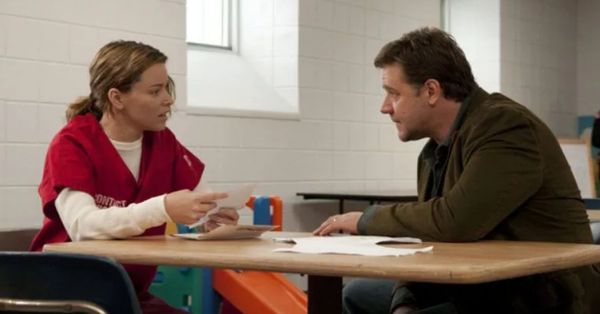Eye For Film >> Movies >> The Next Three Days (2010) Film Review
The Next Three Days
Reviewed by: Owen Van Spall

The Next Three Days is a classic case of an intriguing film concept gone to waste. What should be an exciting, taut prison break drama that sees one ordinary man go up against the police and a modern American prison, instead ends up a muted affair where we never feel the stakes are that high.
Russell Crowe plays teacher John Brennan, a very ordinary Pittsburgh American schoolteacher with a beautiful and successful wife and a young son. Life seems perfect, until wife Lara (Elizabeth Banks) is suddenly arrested one morning for the murder of her boss, whom she was known to quarrel with. She was seen leaving the crime scene, her fingerprints were on the murder weapon and the victim’s blood was on her jacket. With no other suspects, Lara is soon convicted and jailed for life. She insists she is innocent.

Three years pass, and John has to face the unbearable reality that Lara is never getting out. All appeals have failed, he’s out of funds, and no other witnesses have come forward. Fewer and fewer of his friends and family even seem to believe in Lara’s innocence anymore. When Lara attempts suicide, however, a desperate John realises there is one last solution he could try - break her out of prison. With no expertise at all in a life of crime, little money and no help, John has to somehow put together a prison break plan before his wife is either transferred from prison or succeeds in her next suicide attempt.
For a film like this to succeed with it miscarriage-of-justice concept, getting the audience to invest in the character’s plight is crucial. But Crowe and Banks never engage us enough here, though this at least partly due to the material they are given. Banks simply doesn’t get to convey enough of a sense of intense peril and deterioration (for example after her suicide attempt she is soon seemingly back to normal, and never attempts to kill herself in jail again, which somewhat takes the element of the ticking clock out from the film). Crowe is usually a commanding presence but seems restrained and muted here, perhaps intentionally trying to convey Brennan’s ordinariness and total unsuitability to the task of a modern prison break. We never feel the depths of his obsession and despair.
The film also doesn’t use its other casting assets adequately. Liam Neeson and Brian Dennehy both make supporting appearances but they are barely given anything to do. Neeson’s character, in particular, has more potential than his screen time gives him - he plays a former inmate who executed several successful prison breaks, certainly a character far more interesting than Crowe’s. But just as he is tantalising us by passing on instructions to Brennan about how to break out of jail and stay out, his character disappears, never to return. What could have been a fascinating technical study of a modern jailbreak alongside the miscarriage of justice drama is sadly passed over.
Arguing that a lack of plausibility also lets this film down seems somewhat unfair, given the inherent outlandishness of the concept. But all films arguably have their own internal logic and they break those rules at their peril. The forward progress of our hero in The Next Three Days is dependent on a staggering level of incompetence from police and prison guards alike to the point where it becomes comedic. At one point Crowe literally is outwitting police officers by tricking them using decoys of dropped clothes on corridor floors, and even deploys the old ‘pull the alarm on a subway train so it stops before a station’ trick. Clearly American police don’t watch enough movies, as they fall for these rudimentary tactics every time.
The film does touch, briefly, on one angle that would have redeemed the proceedings somewhat. At one point a frustrated and desperate Lara declares that, for all her husband knows, she might have committed the murder all along. This raises all kinds of narrative possibilities for the Russell Crowe’s character - should he continue with his break out plan if his wife is guilty? Does her believe her? Assuming he does break her out, could he accept her as a wife and mother if she really did carry out the murder? Yet the film decisively dumps this notion eventually, despite teasing us with disjointed flashbacks to the murder night that leave things ambiguous for a good chunk of the film.
The Next Three Days ends up being at best a workmanlike film where you don’t believe enough in either the characters or the scenarios the screenplay constructs for them.
Reviewed on: 20 Nov 2010

















